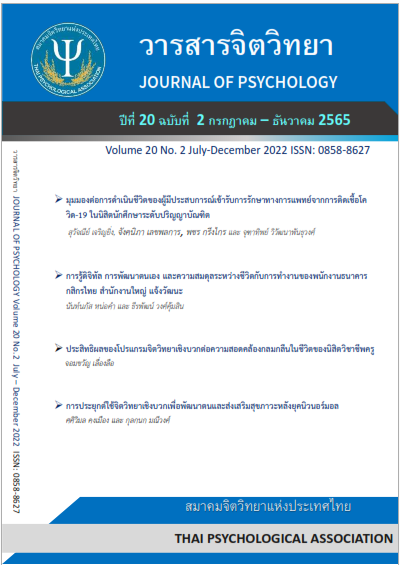การประยุกต์ใช้จิตวิทยาเชิงบวกเพื่อพัฒนาตนและส่งเสริมสุขภาวะหลังยุคนิวนอร์มอล
คำสำคัญ:
จิตวิทยาเชิงบวก, การพัฒนาตนเอง, สุขภาวะ, นิวนอร์มอลบทคัดย่อ
สถานการณ์การแพร่ระบาดของโควิด 19 ตลอดจนวิกฤตทางเศรษฐกิจและสังคมในช่วงปลายปี พ.ศ.2562 ถึงปัจจุบัน หรือที่เรียกว่ายุคนิวนอร์มอล ส่งผลกระทบต่อชีวิตความเป็นอยู่ของคนในสังคมไทยในทุกๆด้านไม่ว่าจะเป็นพฤติกรรมด้านสุขภาพ การเรียน การทำงาน การใช้ชีวิต ความสัมพันธ์ในครอบครัว ชุมชนสังคม รายได้ และสิ่งแวดล้อม สิ่งเหล่านี้ล้วนส่งผลต่อคุณภาพชีวิตของผู้คนในสังคม โดยเฉพาะด้านสุขภาวะของบุคคล เหตุดังกล่าวทำให้บุคคลมีความต้องการในการแสวงหาเทคนิคและวิธีการที่จะผ่านสถานการณ์และวิกฤตินี้ไปให้ได้
บทความวิชาการฉบับนี้มีวัตถุประสงค์ เพื่อทบทวนวรรณกรรมและรวบรวมเทคนิควิธีการในการพัฒนาตนเองด้วยหลักจิตวิทยาเชิงบวกในการรับมือกับวิกฤตสุขภาวะหลังยุคนิวนอร์มอล ที่เน้นหลักในการทำความเข้าใจตนเอง การค้นหาศักยภาพของตนเอง การพัฒนาตนเองให้สามารถปรับตัวกับสถานการณ์ที่เกิดขึ้นในชีวิต การปรับเปลี่ยนวิธีคิดที่จะทำให้ตนเองผ่าน และอยู่ได้ในสถานการณ์วิกฤต ด้วยหลักจิตวิทยาเชิงบวก เพื่อรับมือกับวิกฤตสุขภาวะหลังยุคนิวนอร์มอลต่อไป
เอกสารอ้างอิง
ศิริกร โพธิจักร. (2564). เครียด ซึมเศร้า หมดไฟ ปัญหาทางใจยุคโควิดระบาดhttps://dmh.go.th/news/view.asp?id=2409.
Banjerd, S. (2022). The Effects of Covid-19 towards Human Resource Management and Business Organization in Thailand. Journal of Waraialongkorn (Humanities and Social Science), 12(2), 292-306.
Barbara, L.F. (2001). The role of positive emotions in positive psychology: the broaden-and- build theory of positive emotions. American Psychol, 56(3), 218-26.
Chansiri, I. (2022). The Energy Bus. Amarin bookcenter.
Choojirawongse, P. (2018). Mindset. VLearn.
Courtney E. Ackerman,MA. (2022). What is positive psychology & why is it important?. Positive psychology. https://positivepsychology.com/what-is-positive-psychology-definition/.
Crime in Thailand. (2022). ศูนย์เทคโนโลยีสารสนเทศกลาง สำนักงานตำรวจแห่งชาติ. https://www.crimespolice.com.
Crime Statistics. (2022). เนชั่นออนไลน์. https://www.nationtv.tv/news/378837414.
Gao J. Z Pinping. (2020). Mental Health Problems and Social Media Exposure During COVID-19 Outbreak. https://papers.ssrn.com/sol3/papers.cfm?abstract_id=3541120.
Gordon, J. (2565). รถบัสพลังชีวิต The Energy Bus Animated Training. Read It.
Kaewkangwan, S. (2010). Development psychology for all ages (9th ed.). Thammasart University Press.
Martin, S. (2006). Learning optimism: How to change your mind and your life. A Division of Random House Inc.
Mental Health. (2022). Naew tang kan sang wak seen jai. https://dmh.go.th/news-dmh/view.asp?id=31292.
Martin, S. (2006). Learning optimism: How to change your mind and your life. New York: A Division of Random House Inc. ;.
Puangchompu J., (2016). Elderly people’s use of social media for travel purpose. Business Review, 8 (1), 1-9.
Rungnirundorn,T. (2000). Mental health and psychosocial considerations during COVID-19 outbreak. Chulalongkorn University press.
Sakunpong, N., (2022). Positive Psychology: Basic and Application. Rotchana Printing.
Sanjamsai, S., (2022). A Study of positive psychology capital to reduce depression of college students. Journal of Health Science Research, 16 (1),26-38.
Simaporn, P., Piyanat, P., & Kanokwan, R.,( 2021). Stress and burnout of healthcare worker (HCW) at Siriraj Hospital during the medical treatment of COVID-19 patients, Royal Thai Army Medical Journal, 74(3), 197-204.
Sompoch I. (2019). Theories and Techniques in Behavior Modification. Chulalongkorn University Press.
Supannopaph, P. (2017). Positive Thinking: Life Development Variable. Veridian E-Journal, 11(3).
Ventella, S.W. (2022). The Power of Positive Thinking in Business in Wittaya Plymanee. A.R. Business Press.
Waranusantikul, S., & Kanaprath, S. (2011). Roo jak kao kao jai rao tam ar rai ko rab reun.
CN Ucation.
Wuttaphan, N. (2022). Work behavior and organizational citizenship behavior of frontline workers during COVID-19 in Thailand. Journal of Behavioral Science, 17(1), 58-71.
เผยแพร่แล้ว
รูปแบบการอ้างอิง
ฉบับ
ประเภทบทความ
สัญญาอนุญาต
ลิขสิทธิ์ (c) 2023 สมาคมจิตวิทยาแห่งประเทศไทย

อนุญาตภายใต้เงื่อนไข Creative Commons Attribution-NonCommercial-NoDerivatives 4.0 International License.
บทความที่ได้รับการตีพิมพ์เป็นลิขสิทธิ์ของสมาคมจิตวิทยาแห่งประเทศไทย
ข้อความที่ปรากฎในบทความแต่ละเรื่องในวารสารวิชาการเล่มนี้เป็นความคิดเห็นส่วนตัวของผู้เขียนแต่ละท่านไม่เกี่ยวข้องกับสมาคมจิตวิทยาแห่งประเทศไทย แต่อย่างใด ความรับผิดชอบองค์ประกอบทั้งหมดของบทความแต่ละเรื่องเป็นของผู้เขียนแต่ละท่าน หากมีความผิดพลาดใด ๆ ผู้เขียนแต่ละท่านจะรับผิดชอบบทความของตนเองแต่ผู้เดียว






